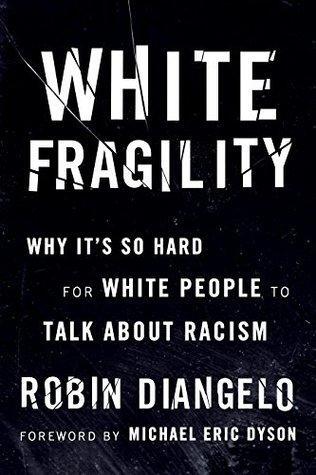
Educator and sociologist Robin DiAngelo is brilliantly thorough, and I am grateful beyond expression. This is unapologetically a book by a white woman written for white people who dispute our part in our historically racist system. It's for people who find the discomfort of the discussion intolerable. And it's also for white people like me who have accepted culpability and have committed themselves to being as uncomfortable as it takes in an effort to become an antiracist—and it gets pretty damned uncomfortable; my last read, Stamped: Racism, Antiracism, and You, gave a new-to-me history that I was never taught in white school and a vivid new awareness of systemic racism and how black people have coped with it that's changed my vision.
White Fragility is clarifying, supportive, and further strengthens my commitment, even as the clear articulation of everything made me sometimes squirm. DiAngelo's genius is the ability to break things down and deliver them as digestible facts. And with that, I'll turn it over to Professor DiAngelo:
What is white fragility?
Given how seldom we [white people] experience racial discomfort in a society we dominate, we haven't had to build our racial stamina. Socialized into a deeply internalized sense of superiority that we either are unaware of or can never admit to ourselves, we become highly fragile in conversations about race. We consider a challenge to our racial worldviews as a challenge to our very identities as good, moral people. Thus, we perceive any attempt to connect us to the system of racism as an unsettling and unfair moral offense. The smallest amount of racial stress is intolerable—the mere suggestion that being white has meaning often triggers a range of defensive responses. These include emotions such as anger, fear, and guilt and behaviors such as argumentation, silence, and withdrawal from the stress-inducing situation. These responses work to reinstate white equilibrium as they repel the challenge, return our racial comfort, and maintain our dominance within the racial hierarchy. I conceptualize this process as white fragility. (1-2)
(I was going to do a Q&A of quotes, but I've highlighted so many that it's easier to say: Read the book if you want to know what you might be hiding from yourself.)
For the last few years, pre- and post-Trump, I wrote and then have been trying to sell a novel about being a member of the human herd. In the United States in particular we value our individuality to a point where sometimes we imagine it exempts us from herd directions or even unconscious herd assumptions and beliefs. There is a psychiatric term for this imagined disconnect: anosognosia—a lack of insight or ability to perceive one's own condition. When my protagonist in the new novel proclaims that she always thinks for herself, she is demonstrating a form of anosognosia (and in the process of writing the book, I thereby discovered my own). All of us who fail to understand that we are members of a system whether we like it or not, and therefore we have been conditioned by it, I believe are suffering from anosognosia. And what's worse is that because of white people's position in this system, we are blind to the nature of the system itself and most often refuse to talk about that. White Fragility is like going from blindness to 20/20 vision about who and where we are.
DiAngelo advocates that we listen to feedback without defending and talk about our racism. If we could just do that—"graciously receive [feedback], reflect, and work to change the behavior" (113), "It would be revolutionary," responds a black man in one of DiAngelo's workshops. Revolutionary!
"An antidote to white fragility is to build up our stamina to bear witness to the pain of racism that we cause," (128) writes DiAngelo.
But to do this—this is me speaking, not DiAngelo—we must simultaneously be willing to see and dismantle our reactions and the underlying unconscious beliefs and the political systems they subsequently enable, which requires an awareness of mirror racist systems within our white psyches. And that is hard.
The only way I've dismantled a fraction of the gazillion distortions that have directed me throughout my life has been through mindfulness—I have to first become aware that the distortions exist and are distortions. Then with gentleness, I can make a little space between the essential me and my distorted thoughts and thereby see them. (You can't control thoughts. If you think you can, you'll just end up hating yourself, or even worse, denying that you think what you think.) When you see thoughts for what they are—conditioned "things"—you can begin to acknowledge them and let them flit through your conscious mind without attaching to them by believing they're true or false. If you practice this enough, you can really change. At least that's my experience. But first you must be willing acknowledge that you might not be right about everything. And that illumination is the gift Robin DiAngelo offers in this mighty book.
Notes
—As I was nearing the end of this book I saw a news report about a black flight attendant who spotted a middle-aged white man reading White Fragility and asked him about it. To understand the healing this book can introduce, watch this CBS News video.
—See a wonderful interview with author Robin DiAngelo here.
—I read a Kindle copy of this book. As I type, libraries now have long waiting lists and the book is on back order at stores. However, I do not recommend getting the audio version; a friend whom I trust said it's like listening to an automaton speak and this made it hard to stay with the book. The information is too important to dilute that way. If you are able to read text, read it. Audio is better than nothing if you cannot do this.